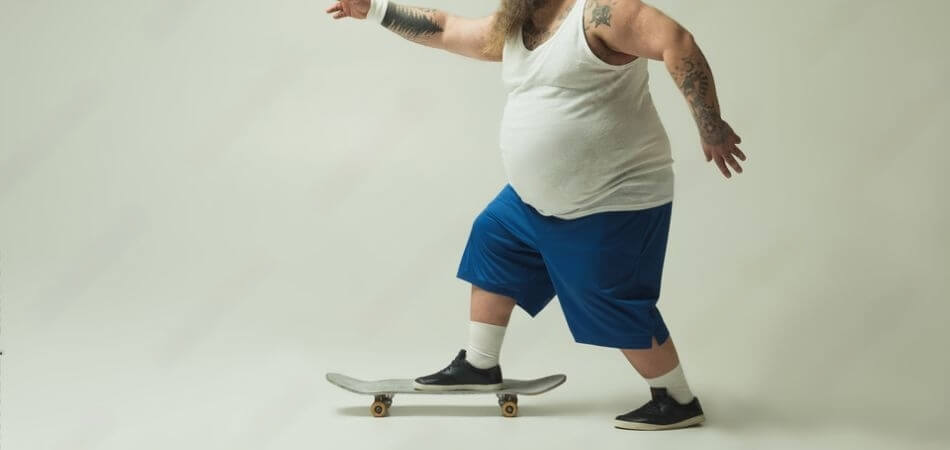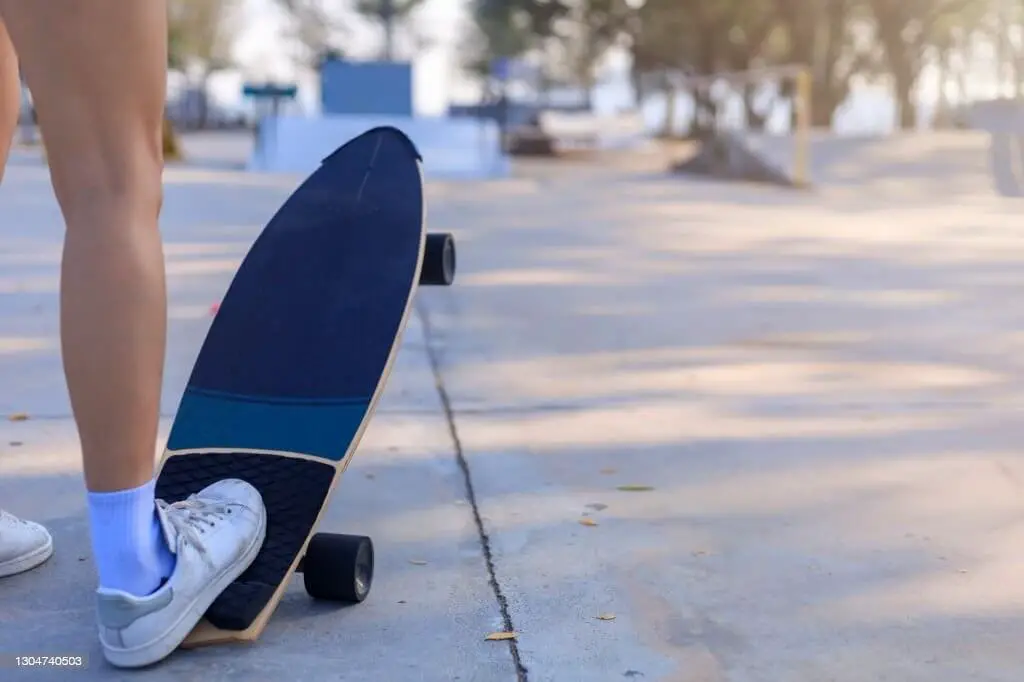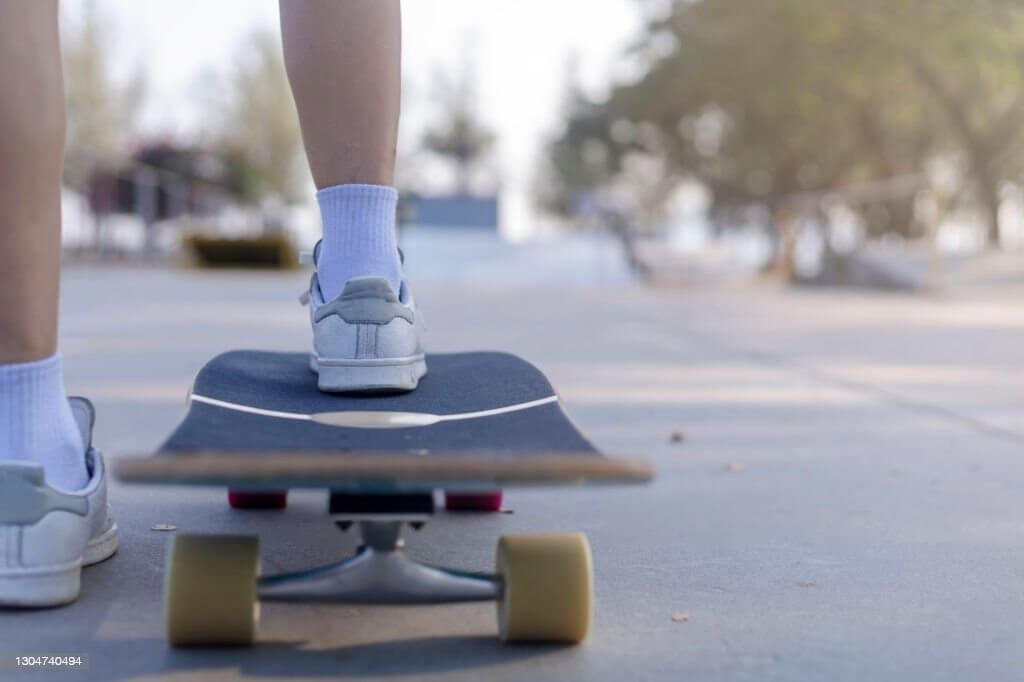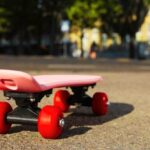Ditch the doubts and drop the stereotypes – because when it comes to skateboarding, size is just a number! “Can Fat People Skateboard?” Prepare to be amazed, as we dive into a world where curves conquer concrete and passion trumps perceptions. Get ready to discover the unapologetic spirit of shredding limits and embracing every twist, turn, and flip with pride. In the realm of skateboarding, there’s no room for body bias.
Breaking Stereotypes, Shredding Limits: Yes, Fat People Can Skateboard So grab your deck and let’s ride into a realm where self-expression rolls free and the skateboard becomes a symbol of breaking barriers. Whether you’re slim, curvy, or somewhere in between, it’s time to unveil the truth – skateboarding is a canvas where everyone carves their unique journey!
Can Fat People Skateboard?
Absolutely, people of all body types can skateboard. Skating abilities are influenced by factors like practice, balance, and determination, not just body size. Heavier individuals might face unique challenges with balance and mobility, but with proper equipment, patience, and guidance, they can enjoy skateboarding. Safety and finding the right board size are essential. Skateboarding promotes inclusivity and encourages individuals to overcome physical barriers while having fun and staying active.

Factors to consider as an overweight beginner skateboarder
- Choose the right board. A wider board with a thicker deck will be more stable and easier to control for an overweight rider. Look for a board that is at least 8 inches wide and has a deck that is at least 7 plys thick.
- Wear protective gear. This is especially important for overweight riders, as they are more likely to be injured in a fall. Make sure to wear a helmet, knee pads, wrist guards, and elbow pads.
- Start slowly. Don’t try to do too much too soon. Start with basic movements and gradually work your way up to more advanced tricks.
- Focus on balance. Balance is essential for skateboarding, and it can be especially challenging for overweight riders. Practice balancing on your board in a safe place, such as a carpeted floor or a grassy area.
- Find a supportive community. There are many online and in-person communities for overweight skateboarders. These communities can provide support, motivation, and tips for getting started.
Here are some additional tips for overweight skateboarders:
- Warm up before you skate. This will help to reduce your risk of injury.
- Stretch after you skate. This will help to improve your flexibility and range of motion.
- Listen to your body. If you’re feeling pain, take a break.
- Don’t be afraid to ask for help. There are many people who are willing to help you learn how to skateboard.
With a little practice and determination, anyone can learn how to skateboard, regardless of their weight. So don’t let anything stop you from getting started!
Examples of overweight pro skateboarders :
- Steve Olson: Olson is a legend in the skateboarding world, and he’s also one of the few pro skaters who is openly overweight. He’s known for his technical skills and his fearless attitude.
- Kris Markovich: Markovich is another pro skater who has inspired others to skate, despite being overweight. He’s known for his stylish tricks and his positive attitude.
- Tony Cox: Cox is a professional vert skater who has won numerous awards. He’s known for his powerful tricks and his determination.
- John Cardiel: Cardiel is a legendary street skater who is known for his creativity and his willingness to take risks. He’s also one of the few pro skaters who has openly talked about his struggles with weight loss.
- Andy Roy: Roy is a professional street skater who is known for his technical skills and his unique style. He’s also one of the few pro skaters who has openly talked about his struggles with weight gain.
Can Fat People Skateboard? These are just a few examples of overweight pro skateboarders who have inspired others to take up the sport. If they can do it, so can you!
How Much Weight Can a Skateboard Hold?
There is no one-size-fits-all answer to the question of how much weight a skateboard can hold. The weight limit of a skateboard will vary depending on the following factors:

- The type of skateboard: Different types of skateboards are designed for different purposes and will have different weight limits. For example, a longboard is designed for cruising and transportation, so it will typically have a higher weight limit than a popsicle stick skateboard, which is designed for tricks and street skating.
- The materials used: The materials used to make a skateboard will also affect its weight limit. Skateboards made with stronger materials, such as maple wood, will typically have higher weight limits than skateboards made with weaker materials, such as plastic.
- The construction of the skateboard: The construction of the skateboard will also affect its weight limit. Skateboards with thicker decks and stronger trucks will typically have higher weight limits than skateboards with thinner decks and weaker trucks.
- The skill level of the skateboarder: The skill level of the skateboarder will also affect the weight limit of the skateboard. More experienced skateboarders are better able to control their boards and avoid putting too much stress on them, so they can typically skateboard with heavier weights than less experienced skateboarders.
In general, most skateboards can hold between 200 and 300 pounds. However, there are some skateboards that can hold even more weight. For example, some longboards can hold up to 400 pounds.
If you are a heavier skateboarder, it is important to choose a skateboard that is designed for your weight. You should also avoid doing tricks or skating in rough terrain, as this can put extra stress on your board and increase the risk of it breaking.
Some tips for heavier skateboarders:
- Choose a skateboard with a thicker deck and stronger trucks.
- Avoid doing tricks or skating in rough terrain.
- Be aware of your weight and how it affects your board.
- If you are concerned about your weight limit, talk to a skateboard shop employee for recommendations.
With a little care and attention, you can enjoy skateboarding regardless of your weight.
Creating a Skateboard Weight Chart and Table:
| Age Group | Weight Range (lbs) | Height Range (ft) | Recommended Skateboard Weight Range (lbs) | Effects on Performance |
| Kids (6-12) | 30 – 100 | 3.5 – 5.0 | 3.5% – 7% of body weight | Lighter setups for easier maneuverability and control. |
| Teens (13-19) | 80 – 160 | 4.5 – 6.5 | 7% – 9% of body weight | Balanced setups for versatile skating styles. |
| Adults (20+) | 100 – 250 | 5.0 – 6.8 | 8% – 10% of body weight | Stability-focused setups for various terrains. |
Interpreting the Chart and Table:
Kids (6-12): Younger skateboarders benefit from lighter setups, which make it easier for them to learn tricks and control the board’s movements. Their lower body weight requires a proportionally lighter skateboard to ensure they can effectively manipulate the board.
Teens (13-19): This age group can handle slightly heavier setups compared to kids, striking a balance between maneuverability and stability. Their growing skill levels and physical development enable them to explore a variety of skateboarding styles.
Adults (20+): Adult skateboarders can opt for slightly heavier setups, which provide added stability and durability. These setups are particularly well-suited for cruising, downhill rides, and transition skating.
Skill Developmen For Overweight Skateboarder
There is no weight limit for skateboarding, and anyone can learn to skateboard regardless of their size. However, there are some challenges that fat people may face when skateboarding, such as:
- Increased difficulty balancing: Carrying extra weight can make it more difficult to balance on a skateboard. This can make it more challenging to learn tricks and maneuvers, and it can also increase the risk of falling.
- Increased risk of injury: Fat people may be at an increased risk of injury when skateboarding, especially if they fall. This is because they have more weight to fall with, and they may not be able to absorb the impact of a fall as well as someone who is lighter.
- Need for specialized equipment: Fat people may need to use specialized equipment, such as wider skateboard decks and softer wheels, to make skateboarding easier and safer.
Despite these challenges, fat people can still learn to skateboard and enjoy the sport. With practice and perseverance, anyone can learn to skateboard, regardless of their size.
Examples of fat people who have successfully learned to skateboard:
- Shaun Palmer: Palmer is a professional skateboarder who weighs over 300 pounds. He is known for his innovative tricks and his ability to skate at a high level despite his size.
- Robbie Madison: Madison is a BMX rider who weighs over 200 pounds. He is known for his aggressive riding style and his ability to perform tricks that are usually only done by smaller riders.
- Chubby Skateboarder: Chubby Skateboarder is a YouTuber who documents his journey learning to skateboard. He has over 100,000 subscribers and his videos have been viewed over 10 million times.
These are just a few examples of fat people who have successfully learned to skateboard. If you are fat and you want to learn to skateboard, don’t let your size stop you. With practice and perseverance, you can achieve your goals.
Learning Curve For Overweight Skateboarders
The skateboarding learning curve for overweight skateboarders can vary depending on several factors, such as your level of fitness, previous experience with balance-based sports, and proper gear.

Challenges that overweight skateboarders may face:
- Increased weight can make it harder to balance and control the board. This is especially true when trying to do tricks or skate on uneven surfaces.
- Overweight skateboarders may be more likely to break a board when they fall. This is because the force of impact is greater when a heavier person falls.
- Overweight skateboarders may be more likely to experience injuries, such as sprains and strains. This is because they are putting more stress on their joints and muscles.
Safety Tips For Overweight Skateboarders
There is no physical reason why being overweight should prevent someone from skateboarding. However, there are some safety considerations that overweight skateboarders should take into account.
Tips for overweight skateboarders to stay safe:
- Start slowly and gradually increase your skills and practice time. Don’t try to do too much too soon, or you’ll increase your risk of injury.
- Wear protective gear, such as a helmet, knee pads, and wrist guards. This will help to minimize injuries if you do fall.
- Choose a board that is designed for heavier riders. These boards are typically wider and have more durable construction.
- Practice on smooth surfaces until you feel comfortable. Once you have mastered the basics, you can start to challenge yourself on more uneven terrain.
- Be aware of your surroundings and avoid skating in areas with a lot of traffic or obstacles.
- Take breaks often and listen to your body. If you’re feeling tired or sore, stop and rest.
- Don’t be afraid to ask for help from other skaters or instructors.
Personal Experience in Overweight Skateboarders
Personal experiences of overweight people who skateboard:
“I’ve been overweight my whole life, and I’ve always wanted to learn how to skateboard. I finally decided to give it a try a few months ago, and it’s been one of the best decisions I’ve ever made. It’s a great way to get exercise, and it’s a lot of fun. I’ve fallen a few times, but I’ve never been seriously injured. I’m still learning, but I’m getting better every day.”
“I’ve been overweight for most of my adult life, and I’ve always been self-conscious about it. But when I started skateboarding, I realized that my weight didn’t matter. I was able to do tricks and have fun just like everyone else. It’s helped me to gain confidence and to feel better about myself.”
“I’m a plus-size woman, and I’ve been skateboarding for about 5 years. I started because I wanted to find a way to get exercise that I would enjoy. I’ve never had any problems with my weight affecting my ability to skateboard. I’ve fallen a few times, but I’ve never been seriously injured. I’ve even won a few skateboarding competitions!”
These are just a few examples of the many personal experiences of overweight people who skateboard. It is clear that being overweight does not prevent someone from enjoying the sport of skateboarding. If you are overweight and you are interested in skateboarding, I encourage you to give it a try. It is a great way to get exercise, have fun, and build confidence.
Benefits For Overweight People
There are many benefits to doing so. Here are a few of the benefits of skateboarding for overweight people:
- Improved cardiovascular health: Skateboarding is a great way to get your heart rate up and improve your cardiovascular health. It can help to reduce your risk of heart disease, stroke, and other chronic health conditions.
- Weight loss: Skateboarding can be a fun and effective way to burn calories and lose weight. It is a full-body workout that can help you to tone your muscles and improve your overall fitness.
- Increased flexibility: Skateboarding can help to improve your flexibility and range of motion. It requires you to move your body in different ways, which can help to loosen up tight muscles and improve your flexibility.
- Enhanced balance and coordination: Skateboarding requires balance and coordination, which are important for overall fitness and health. Skateboarding can help to improve your balance and coordination, which can make it easier to do other activities in your life.
- Reduced stress and anxiety: Skateboarding can be a great way to reduce stress and anxiety. It can be a fun and relaxing way to get exercise, and it can also help to clear your mind and improve your mood.
- Improved self-esteem: Skateboarding can help to improve your self-esteem. It can be a challenging but rewarding activity, and it can help you to feel more confident in your abilities.
If you are overweight and you are looking for a fun and effective way to get exercise, skateboarding is a great option. It is a great way to improve your cardiovascular health, lose weight, increase flexibility, improve balance and coordination, reduce stress and anxiety, and improve your self-esteem.
Skateboard ‘Tricks’ For Overweight People
Skateboard tricks that are easier for overweight people to learn:
- Ollies: Ollies are a basic skateboarding trick that involves jumping into the air while keeping your balance on the board. They are a great way to get started with skateboarding and they can be used to perform other tricks.
- Shuvits: Shuvits are a skateboarding trick that involves rotating your board 180 degrees while keeping your feet on it. They are a great way to improve your balance and coordination.
- Pop shove-its: Pop shove-its are a skateboarding trick that combines an ollie with a shuvit. They are a more advanced trick, but they are still relatively easy to learn for overweight people.
- Cruising: Cruising is simply riding your skateboard around. It is a great way to get exercise and enjoy the outdoors. It is also a great way to build up your balance and coordination.
- Carving: Carving is a skateboarding technique that involves making smooth turns while riding your skateboard. It is a great way to improve your balance and coordination.
These are just a few of the many skateboard tricks that are easier for overweight people to learn. With a little practice, you can learn these tricks and enjoy the sport of skateboarding.
Conclusion
In the exhilarating world of skateboarding, size is no limit. The answer to “Can Fat People Skateboard?” is a resounding yes! Skateboarding embraces diversity, transcending body stereotypes. It’s about passion, balance, and determination, not just physique. So, whether you’re slim or curvy, young or old, hop on that board and ride to your heart’s content. Let the pavement be your canvas of self-expression, breaking all barriers. Skateboarding is for everyone, proving that the thrill of the ride knows no bounds. Embrace your uniqueness and roll on with confidence!
FAQ about Can Fat People Skateboard
Can you be too big to skateboard?
Sure! Skateboarding is awesome for people of different sizes. But if you’re really, really big, like super tall or heavy, finding the right skateboard might be important. Skateboards have weight limits and bigger people might need sturdier boards to be safe.
Where should your weight be when skateboarding?
When you’re skateboarding, keep your weight balanced and centered on the board. This helps you stay in control and prevents falls. Distribute your weight evenly between both feet to keep the board steady. Leaning too much forward or backward can make you lose balance. Remember, staying balanced on your skateboard makes riding smoother and safer!
Am I too fat to go on a longboard?
Wonderful! Your weight doesn’t have to stop you from enjoying a longboard. Most longboards can handle various weights, and there are options designed for different body types. It’s best to check the specific weight limit of the longboard you’re interested in.
Will skateboarding get me in shape?
Absolutely! Skateboarding is a super fun way to stay fit. It gives your muscles a good workout, especially your legs and core. Balancing and pushing the skateboard around burns calories and improves coordination. Just riding and practicing tricks can help you build strength and stamina over time. So, yes, skateboarding can definitely help you get in shape while you’re having a blast on your board!








